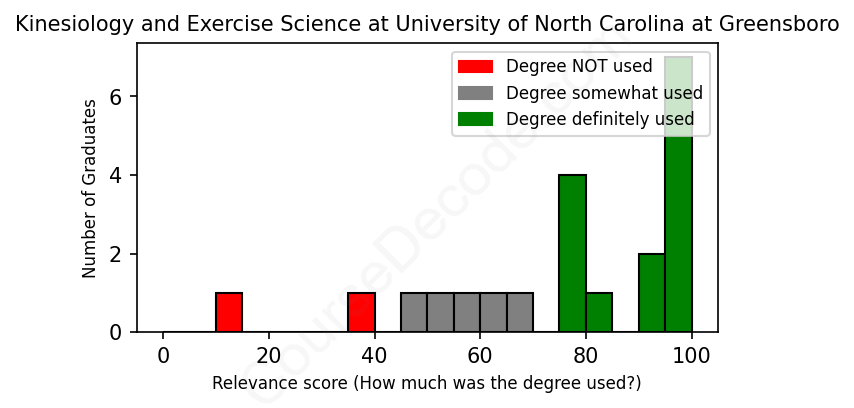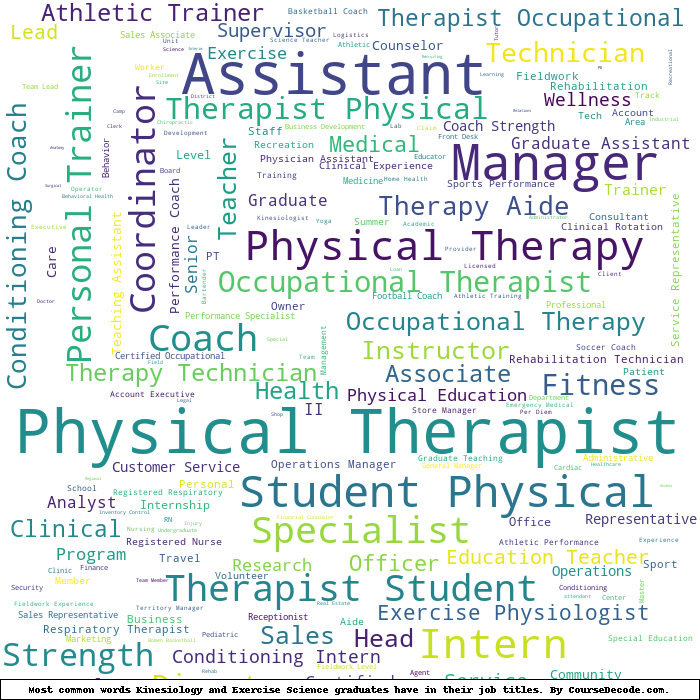
First, some facts. Of the Kinesiology and Exercise Science graduates from University of North Carolina at Greensboro we've analyzed , here's how many have used (or NOT used) their degree in their career:

These are estimates based on AI analysis of 21 LinkedIn profiles (see below).
The verdict? Above average. Overall, with an average relevance score of 76%, Kinesiology and Exercise Science graduates from University of North Carolina at Greensboro have a higher likelihood (+9%) of finding work in this field compared to the average graduate across all fields:
And for comparison, here's the chart for all profiles we've looked at across all degrees.
Also, after graduating, 42% of these graduates have pursued further education other than another Bachelor's degree (such as a Masters degree or other), compared to the average across all profiles of 35%. This suggests you may need more than just a Bachelors degree to be competitive as a Kinesiology and Exercise Science graduate.
See the details:
|
Relevance score: 100% We think this person has gone into a career highly relevant to their degree. We think this person has gone into a career highly relevant to their degree.
DEGREE INFOGraduated in 2022 from University of North Carolina at Greensboro with a Bachelor of Science - BS in Kinesiology and Exercise Science. No other secondary education since. JOB HISTORY SINCE GRADUATIONGeneral Manager Stretch Zone Jan 2023 - Present ABOUTNo information provided. |
The top 10 most common jobs done by the graduates we've analyzed (ranked most common to least) are:
From the analysis of their LinkedIn profiles, it seems that a lot of graduates from the University of North Carolina at Greensboro with degrees in Kinesiology and Exercise Science have landed jobs directly related to their field, particularly in rehabilitation and fitness. Common roles include Physical Therapists, Occupational Therapists, Exercise Specialists, Personal Trainers, and various coaching positions. These jobs typically require a strong understanding of kinesiology and exercise principles, allowing them to apply the knowledge they gained during their studies in real-world settings. For instance, being a Physical Therapist or an Exercise Specialist directly involves hands-on applications of kinesiology concepts to help patients recover and improve their physical health. It’s cool to see how these roles help people get back on their feet or even lead healthier lives through tailored exercise programs!
However, not all jobs seem to maintain that strong link to kinesiology and exercise science. Many graduates have also ventured into positions like project management, administrative roles, and sales, which may only tangentially relate to their degree. For example, roles like Operations Coordinator or Clinical Research Coordinator involve skills that don’t directly utilize their kinesiology training. Similarly, while some teaching positions or administrative roles may touch on related topics, they don’t fully engage the core concepts of kinesiology and exercise science. Overall, while a significant number of graduates are applying their degrees in relevant and impactful ways, there’s also a noticeable trend toward careers that don’t leverage their specialized knowledge directly, which is something to keep in mind if you’re considering this path yourself!
Here is a visual representation of the most common words in job titles for Kinesiology and Exercise Science graduates (this is across all Kinesiology and Exercise Science graduates we've analyzed, not just those who went to University of North Carolina at Greensboro):

Graduates from the University of North Carolina at Greensboro with a degree in Kinesiology and Exercise Science generally tend to pursue careers that are closely aligned with their field of study, especially in their early careers. Many start off in roles like exercise specialists, personal trainers, and rehabilitation technicians soon after graduating, which makes sense given their academic background. For instance, many graduates have taken up positions as physical therapists, occupational therapists, and fitness coaches. This suggests a robust pipeline into relevant careers right out of college, showcasing that they’re equipped with practical skills and knowledge that employers find valuable immediately.
As time goes on—let's say five to ten years down the road—the trend seems to stay positive. Many alumni advance into more specialized or managerial roles within health and fitness, rehabilitation, or wellness sectors. Some even venture into unique roles like project coordinators in healthcare settings or start their own personal training businesses. However, there are also instances where some grads diverged into unrelated fields, like roles in management or sales, which indicates that while the foundation of a kinesiology degree is strong for health-related careers, it can also lead to varied paths in broader professional arenas. Overall, while there's an encouraging trend of staying within relevant career trajectories, not all graduates consistently remain in fields directly tied to kinesiology or exercise science, but many do find fulfilling careers related to health and wellness.
Alright, so when it comes to a Bachelor's in Kinesiology and Exercise Science at UNCG, it’s about what you’d expect from a degree in that field—definitely more on the manageable side compared to some of the heavier sciences like engineering or pre-med. You’ll be diving into topics like anatomy, physiology, and biomechanics, which can be a little challenging, but if you're into sports, fitness, or health, you’ll probably find the content pretty engaging. The workload is about average, with a mix of lectures, labs, and some hands-on experiences. So, if you have a genuine interest in the subject, you might find it hard, but not impossible, and you can definitely rock it with some effort!
Most commonly, in the LinkedIn profiles we've looked at, it takes people 4 years to finish a Bachelor degree in Kinesiology and Exercise Science.
Looking at the job history of these Kinesiology and Exercise Science grads from UNC Greensboro, it seems like they’ve had a pretty mixed bag when it comes to making money. While some have landed solid positions like Director of Rehabilitation Services or Senior Manager roles, which likely pay well, others are in more entry-level or less lucrative roles, like servers or personal trainers, especially early in their careers. A lot of them are working in healthcare and rehab settings where salaries can be decent, but some are still figuring things out, which means their earnings might not be what you’d call “decent” just yet. Overall, it seems like there’s potential for good money down the line, especially for those gaining experience and moving up the ladder, but some are probably still in the process of getting there.
Here is a visual representation of the most common words seen in the "about" section of LinkedIn profiles who have a Bachelor degree in Kinesiology and Exercise Science (this is across all Kinesiology and Exercise Science graduates we've analyzed, not just those who went to University of North Carolina at Greensboro). This may or may not be useful:

Here are all colleges offering a Bachelor degree in Kinesiology and Exercise Science (ordered by the average relevance score of their Kinesiology and Exercise Science graduates, best to worst) where we have analyzed at least 10 of their graduates: